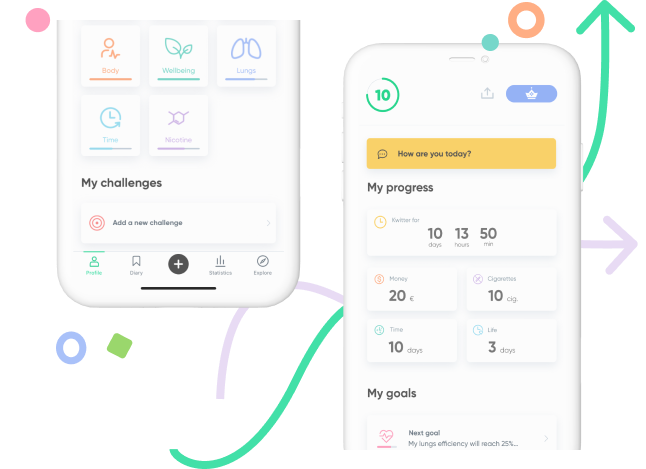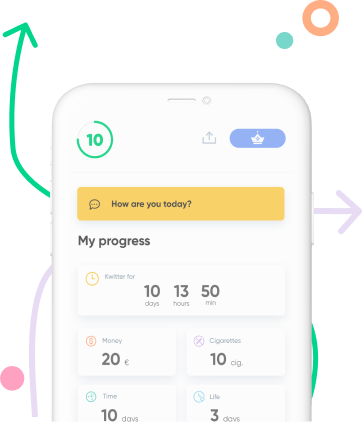September 8, 2021
Tips
6 tips for Quitting Smoking and Dealing with Tobacco Dependence
How to quit smoking and deal with smoking dependence? Many people ask themselves this question. Here are our tips on how to do it.
When you quit smoking, you have to learn how to deal with the developed dependence. After briefly recalling underlying mechanisms of dependence in this article, we share with you our advice and our community’s tips on how to overcome this dependence!
What causes tobacco dependence?
Before giving you our advice on how to deal with it, it is essential to understand how nicotine dependence (the addictive substance in tobacco) works. But rather than talking about “nicotine dependence”, we should instead talk about “tobacco dependence” or “cigarette or vape dependence”, as there are several. Cigarettes, but also vape, can thus be the cause of :
A physiological dependence;
A behavioral and environmental dependence;
A psychological dependence.
These three types of dependence can be present to greater or lesser degrees depending on the smoker. Curious to find out which one has the most influence on you? With its preparation program, the Kwit application helps you identify your dependence profile and find the right strategies to deal with it.
Physiological dependence on nicotine
Physiological dependence occurs when nicotine reaches the brain at a faster rate. The quicker and more erratic the nicotine is supplied, the more addictive it becomes. With cigarettes or vape, nicotine reaches the brain in a few seconds, while substitutes take 30 minutes. In the case of physiological dependence, the lack of nicotine -tobacco's addictive substance- pushes you to go back to your old habits.
The average half-life of a cigarette is around 2 hours. This means that for two hours, the amount of nicotine consumed remains in your body. As you smoke, your brain gets used to a specific dose of nicotine and will do its best to make sure it gets it. After you stop smoking or using vape, the nicotine disappears from your body. This It is then that withdrawal symptoms (irritability, fatigue, nervousness, sleep disorders, etc.) may appear leading you to fall back into your old habits.
Physiological dependence is, however, one of the fastest to fade, so stay strong! You can do it.
Behavioral and environmental dependence on cigarettes
Behavioral and environmental dependence is linked to your habits and your lifestyle. Automatic patterns have become part of your routine, and sometimes you consume without even realizing it or wanting to. For instance, that cigarette you smoke while sipping your coffee. Our smoking cessation preparation program helps you become aware of these patterns and tackle these automatisms.
This dependence can also be linked to your environment, and more specifically, to the people you frequent. If your partner or your colleagues smoke in your presence, you will be more tempted to imitate them, even if you don't feel the need to do so at the time.
The psychological dependence on cigarettes
Many smokers use cigarettes or vape to deal with their emotions and, more particularly, stress. Often, they cannot conceive of any other way of dealing with them. Then gradually, they build misconceptions such as: “I will get fat if I stop smoking”, “I can not be happy without cigarettes”, “I will always want to smoke if I stop”, etc.
In other words: if you find it hard to picture yourself without smoking. This phenomenon is what is known as psychological dependence.
The following tips will help you deal with the different aspects of smoking dependence.
Our first tip is to keep your mind busy to cope with cravings. This makes sense when you consider that cravings only last 2-5 minutes. During this time, it's important that you do something to push the craving into your brain’s background so that you don't think about it as much.
Keeping yourself distracted from cravings will help deal with all three types of dependence, especially the physical one. Since nicotine is responsible for causing withdrawal, many of your cravings for cigarettes or vaping are also caused by it.
When you quit smoking, you should know there is no shame in asking for help if you feel the need. Quite the contrary! Whether it's someone close to you or a qualified healthcare professional, you may find a friendly ear willing to help you through your smoking cessation.
By accepting the help that is offered to you, you will gain an outside perspective on your dependence and thus find solutions to deal with it.
Kwit, our quit smoking application, helps you do just that. Designed to be fun and friendly. It supports and guides you on every step of your journey. Don't think about it anymore and download it now!

Our third tip for dealing with your dependence is to understand it. As we've seen that there are different types of dependences and that they all manifest differently in smokers. Understanding your dependence profile will help you see things more clearly and determine which type of dependence has the most significant influence on you. Then you can find the most appropriate solution. If it is :
Physiological dependence: consider using nicotine substitutes.
Behavioral and environmental dependence: change some of your habits.
Psychological dependence: it is crucial to deconstruct your limiting belief.
As explained above, one of the reasons for physiological dependence on cigarettes is the speed at which nicotine reaches the brain. To fight it and overcome the withdrawal symptoms, you can use nicotine substitutes. Be sure to ask a qualified health care professional for advice on your choice!
Kwit allows you to track and monitor your consumption of these substitutes and vape. So you can assess your current nicotine consumption and gradually reduce it, as soon as you feel ready.
As a result of behavioral and environmental dependence, you have developed a smoking habit at specific times or in certain situations. Changing these habits can help you cope with and overcome this dependence.
Kwit’s preparation program helps you identify which cigarettes you smoke by mere habit and which ones you do not. This will bring awareness on your smoking habits, allowing you to consider alternative activities to replace them.
Psychological dependence stems from the limiting beliefs associated with smoking. Often these misconceptions are misleading and prevent you from living the life you want.
Therefore, when you stop smoking or vaping, you must learn to recognize and then deconstruct these false beliefs. Here are the different steps that will allow you to do this:
Identify your false beliefs.
Replace them with constructive ones.
Project yourself into the future.
Identify your limiting beliefs
In this first step, you need to identify your limiting beliefs. These can take many different forms:
“I need a cigarette to relieve stress.”
“If I quit smoking, I'll have cravings for the rest of my life.”
“If a craving strikes, I have to act on it immediately.”
“I can't live without cigarettes.”
“Smoking is part of my identity.”
Etc.
Replacing your limiting beliefs with more constructive ones
After identifying your limiting beliefs, you can think about which constructive beliefs you want to replace them with. For example:
“If I'm stressed, it's not smoking that helps, but the deep breathing.”
“If I quit smoking, I may have cravings for a while, but they will fade over time.”
“If I feel an urge to smoke, I am in control of how I respond to it. I'm strong enough to delay acting on it, or not acting at all.”
“I can totally live without cigarettes.”
“I was not born a smoker, so I can go back to being a non-smoker.”
Etc.
To help you convince yourself of these new constructive beliefs and integrate them, think about the benefits that your new life without tobacco will bring you!
Projecting yourself into the future
Now, you have integrated your new constructive beliefs, and they are a part of you. It's time to look into the future and imagine what these new beliefs can do for you and what they can help you achieve. For example, consider how can they help you change:
Your behavior?
Your environment?
Your life in general?
These new constructive beliefs will help you get closer to the life you want to lead.
Did you like this article? Follow us on social media for daily tips!




